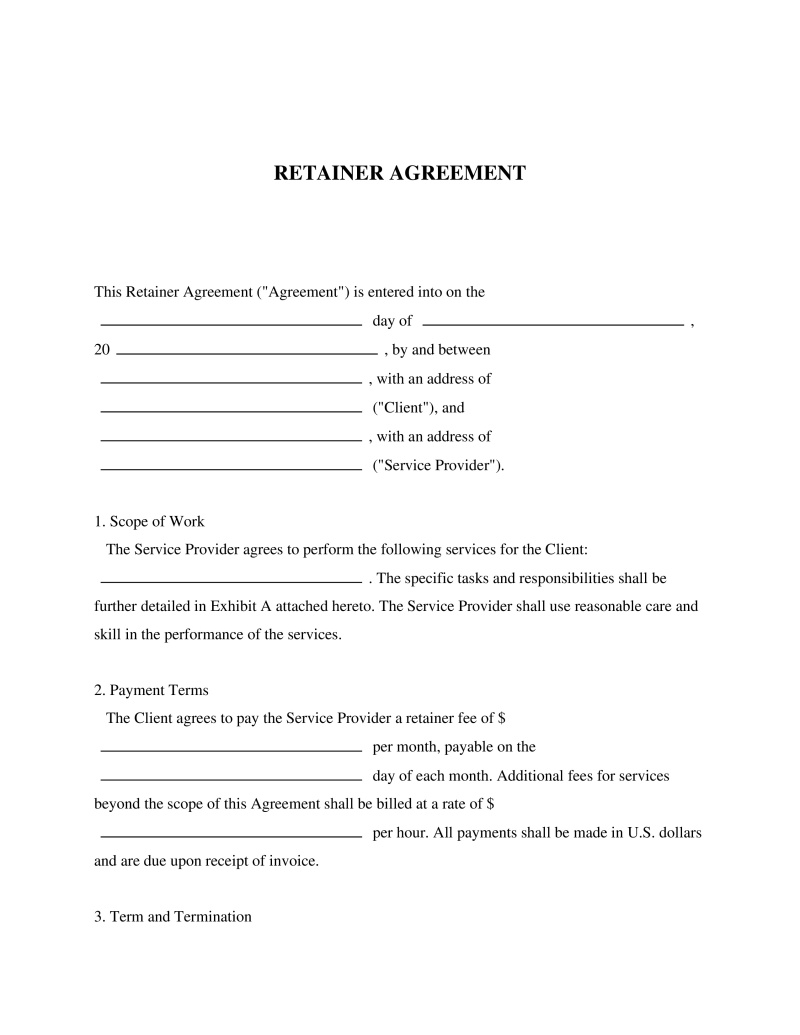A Retainer Agreement is a legal contract between a service provider and a client for future services.
Client Name
Provide the full legal name of the client, including first name, middle name (if any), and last name. Make sure to use the name exactly as it appears on official documents, as this is important for legal identification and contracts. Avoid using nicknames or abbreviations, as they can lead to discrepancies in legal matters.

Table of Contents
What is a Retainer Agreement?
A Retainer Agreement is a legally binding document between a client and a service provider, often a lawyer, wherein the client pays in advance for professional services to be rendered over a specified period. This arrangement not only ensures that the lawyer is available to the client during this time but also facilitates a more detailed understanding of the legal services to be provided, including their scope and limitations. Individuals or businesses seeking legal representation on an ongoing basis find such agreements essential, as they allow for better financial planning and provide a sense of security knowing that legal assistance is readily available when needed.
Key Features
Important Provisions
- Payment Terms: Details including amount of retainer fee, payment schedule, and conditions for refund or replenishment.
- Scope of Services: Clearly defines what legal services are included and potentially any that are excluded from the agreement.
- Termination Clause: Explains how either party may terminate the agreement prematurely and any consequences thereof.
- Confidentiality Clause: Obligates both parties to keep information shared during the engagement confidential.
- Dispute Resolution: Specifies how disputes related to the agreement will be resolved, potentially including arbitration or mediation requirements.
Pros and Cons
Pros
- +Ensures availability of a lawyer for legal advice and representation over an agreed period.
- +Facilitates budget management by setting clear expectations on legal expenses upfront.
- +Strengthens client-lawyer relationship through clearly defined responsibilities and expectations.
- +Provides legal protection for both parties with detailed terms and conditions.
- +Allows for customization to fit the specific needs of each unique client-lawyer relationship.
Cons
- -Might require an initial financial commitment that could be substantial depending on the retainer fee.
- -The client may feel locked into an agreement even if they wish to switch lawyers due to dissatisfaction.
- -Adjustments or termination of the agreement before its expiry could result in complications or additional costs.
Common Uses
- Ongoing legal consultation and representation for businesses.
- Individuals requiring continuous legal support for personal matters, such as estate planning or divorce proceedings.
- Companies needing regular assistance with contract reviews or negotiations.
- Start-ups seeking legal guidance on compliance, intellectual property rights, and other foundational issues.
- Real estate investors or developers requiring consistent legal oversight on transactions and disputes.
- Non-profit organizations looking for legal advice on governance, fundraising activities, and regulatory compliance.
Frequently Asked Questions
Do you have a question about a Retainer Agreement?
Example questions:
Not the form you're looking for?
Try our legal document generator to create a custom document
Community Discussion
Share your experience and help others
Legal Notice: Comments are personal opinions and do not constitute legal advice. Always consult a qualified attorney for matters specific to your situation.
Comments (0)
Leave a Comment
No comments yet. Be the first to comment!